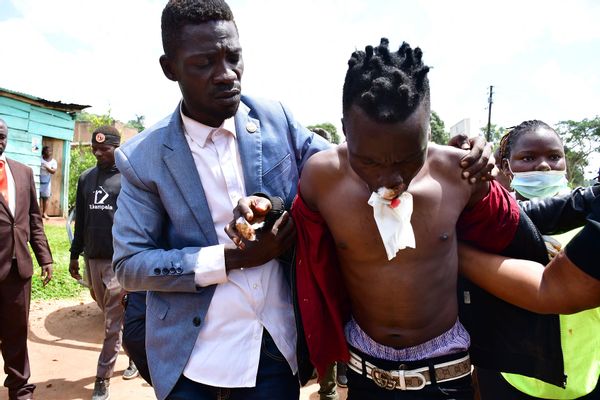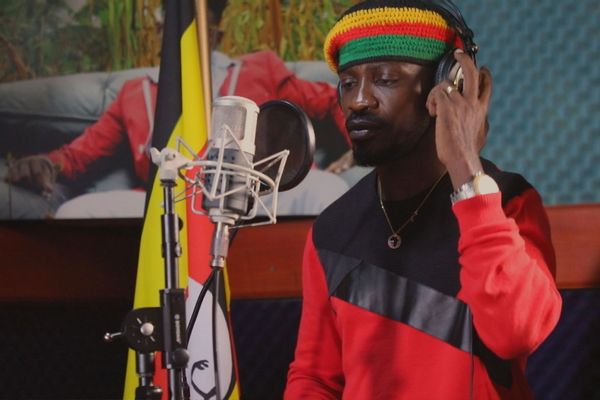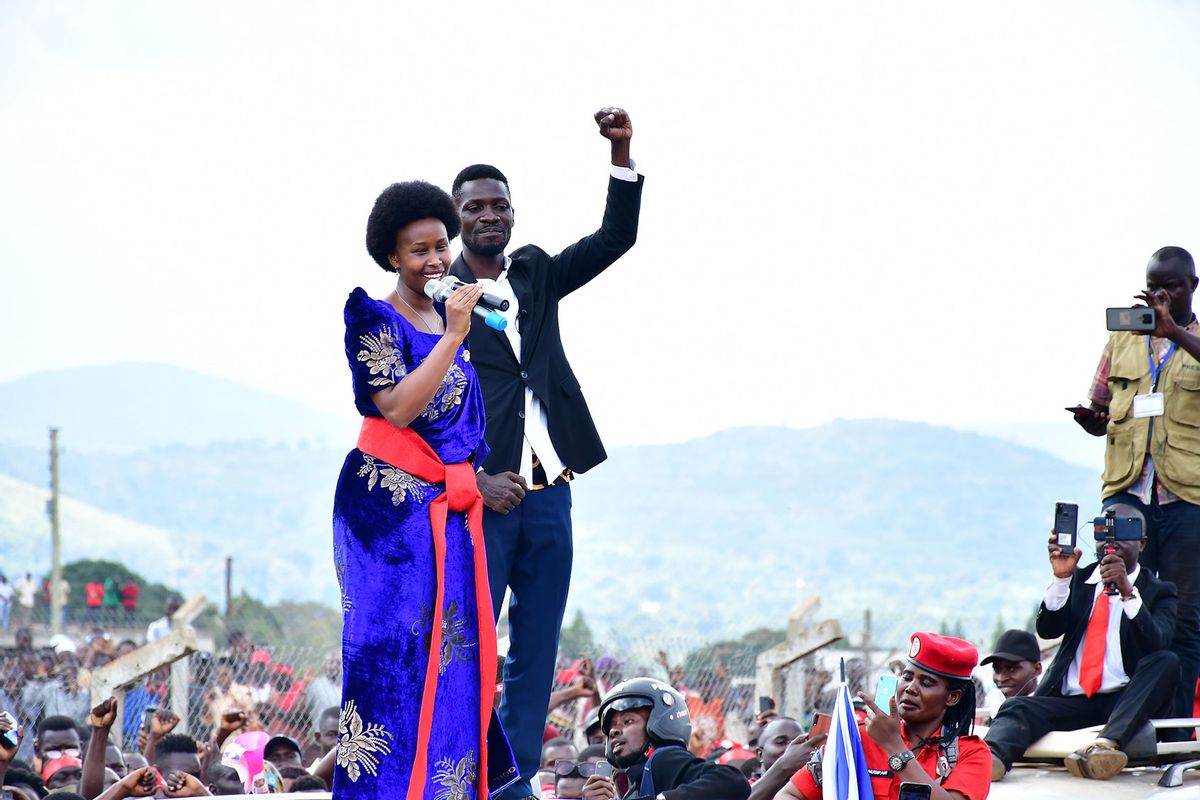A week before Bobi Wine and his wife Barbara Itungo Kyagulanyi received word that their documentary "Bobi Wine: The People's President" had been nominated for an Academy Award, the Uganda government placed them under house arrest.
"We just wanted to tell our story and smuggle it, sneak it out of our country, because we have a country where the media is very securely controlled by the regime."
The documentary follows Wine through his campaign to unseat Yoweri Kaguta Museveni in Uganda's 2021 presidential election, who has been in power for nearly four decades. Museveni’s military police arrested Wine many times over the years on charges related to his political and social activism, first as an artist, and more lately as the opposition’s leader. But after "The People's President" received an Oscar nod, he says the military withdrew from his family's home.
“Bobi Wine: The People’s President” spends six years following the musician turned politician and activist, whose real name is Robert Kyagulanyi Ssentamu, as he transitions from one of the country’s most popular stars into a political force who poses a fierce challenge to an entrenched and corrupt regime.
On Oscar night, “Bobi Wine: The People’s President" will compete with “Four Daughters,” “20 Days in Mariupol,” “The Eternal Memory” and “To Kill a Tiger.” But the worldwide exposure for “The People’s President" is not without a steep cost. Moses Bwayo, the movie’s co-director and director of photography, has been tortured, shot in the face, and is currently seeking asylum in the United States for himself and his wife.
Regime forces confiscated footage and stole or destroyed their equipment. Nevertheless, Bwayo and Christopher Sharp, the movie’s other director and producer, were able to smuggle more than 4,000 hours of footage out of the country by working with sympathetic white journalists.
Museveni’s government tightly controls the media, banning Wine’s music along with curtailing the public’s access to certain social media platforms.
And yet, as Wine and Kyagulanyi were visiting Pasadena, Calif., as part of National Geographic’s presentations for the Television Critics Association’s winter press tour, Wine told reporters that Museveni invited an Emmy-nominated director to counter “The People’s President” by making a tourist-friendly documentary about Uganda's natural beauty.
“Of course, they're not showing the schools and hospitals,” he said during a panel, adding that the documentary has netted some positives for his family as well. “There has been more fear for the camera, more safety for us and more effort to cleanse the image because, for a long time, all this could not escape home.”
In Pasadena, Salon sat down with Bobi Wine and Barbara Itungo Kyagulanyi to talk about the ways that the documentary has become “a bulletproof vest” for them as well as the lessons Americans might draw from his story.
This interview has been lightly edited for length and clarity.
We hold a very America-centered view of current events. What that means for the rest of the world is that unless something is happening that's directly aligned with our interests, either politically or socially, people don't pay as much attention as they should. What did it mean to you when you first heard that that film was nominated?
Bobi Wine: Being nominated for the Oscars was [beyond] our wildest imaginations. . . . We just wanted to tell our story and smuggle it, sneak it out of our country, because we have a country where the media is very securely controlled by the regime. And the only way we could tell our story, unfiltered, unedited, was by a documentary. To see that our documentary got such a huge viewership and attention, for us, is mega. But the Oscar nomination, above everything else, is a lifeline. It’s an additional layer of safety, knowing that the world is watching what is happening in Uganda, and therefore, it's much harder now for the regime – not impossible, but harder – to eliminate us.
Barbie, what was it like for you to have to have cameras on you as a presidential candidate’s wife, and on top of that, all of those things happening to your family?
"The camera was more like a bulletproof jacket."
Barbie Kyagulanyi: For me, I was very happy that we had that camera – in the end, not initially. Initially, it was just filming him and what he does, but as we went along and started the most challenging and dangerous times . . . the camera was more like a bulletproof jacket. I felt a little bit more comforted that whatever was going to happen there, we would have it recorded. And then at least we would know exactly how whatever happened, happened.
 Bobi Wine assists his music producer Dan Magic into a hospital in Kayunga, Uganda, after he was injured by police teargas canisters and rubber bullets used to disperse crowds on December 1, 2020. (Southern Films/Lookman Kampala)
Bobi Wine assists his music producer Dan Magic into a hospital in Kayunga, Uganda, after he was injured by police teargas canisters and rubber bullets used to disperse crowds on December 1, 2020. (Southern Films/Lookman Kampala)
Another recent example of that was the increase of coverage here of the war going on in Ukraine and of Volodymyr Zelenskyy. I wonder if you had any thoughts about the way that the media turned its eyes towards Europe versus the way it monitors conflicts and challenges to democracy in different African countries, including Uganda.
Wine: Of course, the media initially was not as gagged. And it wasn't as dangerous to cover us at first. Indeed, when the filming of this documentary started, for us the interest kept changing. Because the first interest for us in accepting the cameras was to allow an inspiring story to be recorded. Our intention was to inspire young people to get involved in politics. When it got more serious and more [punishments] were unleashed on us, then we saw it as an opportunity to expose the impunity of the regime.
Back home, that’s something that had been very securely kept from the rest of the world. But again, towards the end, the camera had become a bulletproof vest.
What goes out in the world is controlled and is only meant to paint a rosy picture. But this was defying all that. There came a time when even journalists and people [with] cameras were very much in danger. Moses, the director of photography was beaten, arrested, thrown in jail, shot in the face, all that. He had to flee the country and is living in America, seeking political asylum. The same thing happened to so many journalists. Those who did not lose their jobs were thrown in jail. Very many of them are across the world seeking safety.
I’m wondering what your impression is of what's been going on here in terms of both the presidential campaign and the stakes of this election. Second, what is your impression of the state of this country’s democracy?
"Violence will only beget more violence."
Wine: I would say, look at our story. It should communicate to people all over the world, especially you people in America who have the luxury of democracy, not to take it for granted. It can be lost. This film speaks not only about the situation in Uganda, but the fragility of democracy across the world, and why it must be guarded very, very jealously. You have what we are yearning for. And as you have seen in the past, that is not a given. It is a constant fight, not just to achieve, but to maintain a democracy. That is the most amazing thing that you have, and that you must not lose.
Every time you think of losing your democracy, look back at Uganda and be inspired to defend your democracy.
We need your help to stay independent
Do you think that there's a shift going on in Uganda now? Do you see that there may be a future very close at hand where its people will be able to select their own leaders?
Wine: There is definitely a future where people are able to select their leaders. But will their selection be allowed to stand? That is the question.
. . . People have many times suggested numerous things, including violence. However, our leadership is a leadership that discourages violence and believes in nonviolence. I believe that violence will only beget more violence. But if we achieve our freedom nonviolently, first of all, it means that all people will be involved in it. If we achieve it nonviolently, then we can maintain its nonviolence, and that's the most progressive way to keep going.
That’s an important message especially for people in the United States to hear. Because there are a lot of folks who believe a civil war is inevitable. What would you say to someone who views nonviolent dissent as a relic of the past?
Wine: Nonviolent resistance breaks resistance. I disagree with violence because violence only gives rise to violent men and violent methods and violent keeping of power. . . . We are a living example. Uganda has never had a peaceful transfer of power since independence [in 1962]. And that's a vicious circle that we must stop by using other means. Yes, we know that nonviolence sucks sometimes because it delays immediate results. We're not looking for immediate results, because immediate results are usually temporary. We’re looking for lasting results . . . for a lasting democracy.
 Bobi in the studio in "Bobi Wine: The People's President" (Southern Films)
Bobi in the studio in "Bobi Wine: The People's President" (Southern Films)
I wanted to make sure that I talked to you about your art, your music and their power.
Wine: Yeah.
American voters have an interesting relationship with performers. Several actors have become elected officials, from the local and state level to the presidency. Far fewer hip-hop artists and musicians have mounted successful runs for major political positions. And the difference, from what I can see, is that you have someone who projects an image, a fantasy, people come to believe in, versus a message that comes through your music. What role does delivering your message through your music play in your political life and your campaigns?
Wine: The things I'm saying now are the things I've been singing about: equality for men and women, boys and girls. Better health care, better education, justice, respect for human rights, and the like. These are things that I've been talking about, only with a beat and a melody.
And the message that went out to people, this did not happen over just a year or two, but a span of over a decade. It became our way of life, just the people that inspired us, people like Tupac Shakur. He inspired young people so much.
Want a daily wrap-up of all the news and commentary Salon has to offer? Subscribe to our morning newsletter, Crash Course.
So: We go through campaign season, win the Oscar, and your music and the documentary are available here on streaming platforms. What's next in terms of keeping the world's eye on Uganda?
Wine: It has always been a cry and our prayers and our request that the U.S. and the EU reconsider their policies on Uganda. And we don't ask for too much. We're only asking for conditions on the aid up to $1 billion U.S. given to Museveni, conditions like respect for democracy, respect for human rights, and respect for the rule of law. If we get that, this is the biggest solution to our problems. That means when we go to the polls, we will not be massacred. That means when we say something through our vote, it's going to be respected. That has been our cry.
With this film, we present a solid case to the world. And we're asking all the funders to consider it because what is happening in the film is going on courtesy of the funding and support of the international community, particularly America and the EU.
Of course, when the award season ends and the cameras go down, the attention of the media will probably be diverted to other places. As you can see, now the world is in chaos. If it's not Ukraine, it’s Israel and Gaza. If it's not that, it's in the Congo. With so many problems in the world, we are already very grateful that our case has gotten this attention. We'll pray that by the time the cameras go down, those who make the decisions, the American legislators, will have been touched, that we will have provoked their conscience to respond positively. That is what makes sense for us. Otherwise, we shall continue using all possible ways to highlight our plight.
"Bobi Wine: The People's President" is currently streaming on Hulu and Disney+.

Shares